#Polyporus squamosus
Explore tagged Tumblr posts
Text

Cerioporus squamosus
“The mushroom Polyporus squamosus Huds. ex Fr. Photographed in Kinderhook Trail, Wayne National Forest, Ohio, USA. Notes: ‘On standing dead elm.’” - via Wikimedia Commons
#cerioporus squamosus#polyporus squamosus#wikipedia#wikipedia pictures#nature#mushroom#mushroomcore#mushrooms#edible mushrooms#edible fungi#dryad’s saddle#pheasant’s back mushroom#mycology#basidiomycota#basidiomycetes#bracket fungi#agaricomycetes#polyporales#polyporeceae
75 notes
·
View notes
Text

Dryad's Saddle
A cluster of Dryad's Saddle fungi, sprouting from a decaying tree stump in Short wood.
#canon#canonuk#dryad's saddle#fungi#fungus#mushroom#mushrooms#nature#nature reserve#northamptonshire#northants#outdoors#polyporus squamosus#short and southwick woods#short wood and southwick wood#summer#toadstool#toadstools#wildlife trust#wildlife trusts#woodland#woods
45 notes
·
View notes
Text
Polyporus squamosus--Dryad's Saddle/Pheasant Back
They smell like watermelon or cucumber. :) Common in the ravines. They grow on stumps or sick trees. The very first wild mushroom I ever looked up to see if it was edible! Photos are mine, unedited (I think; can't remember if I took a powerline out of the one with the sky showing).
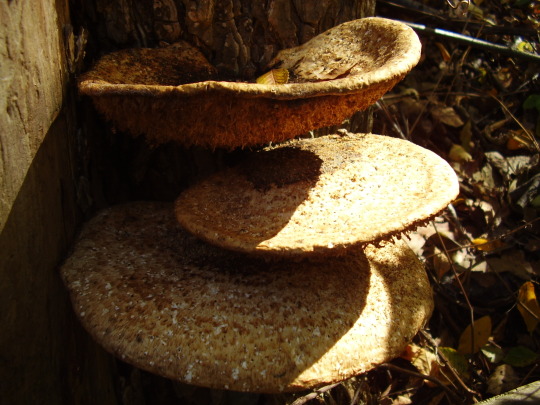

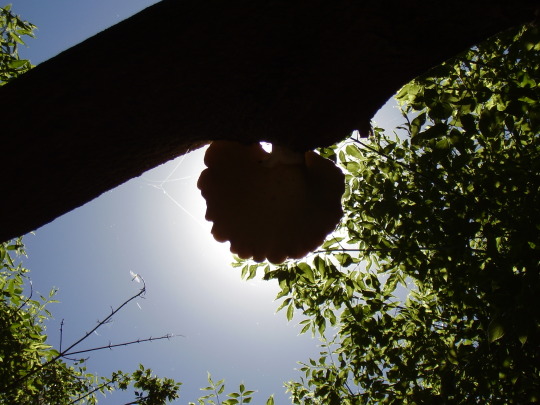

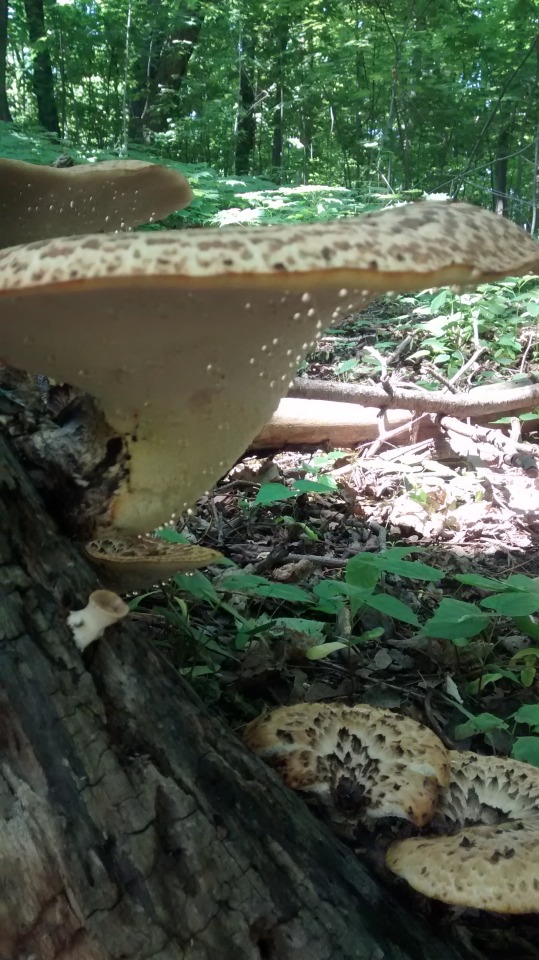
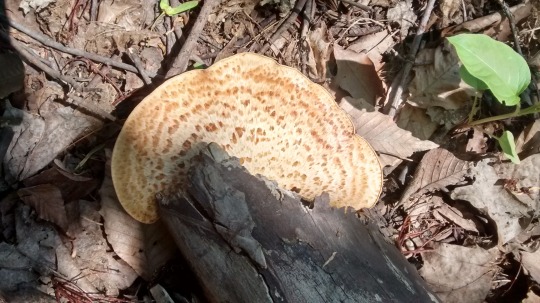

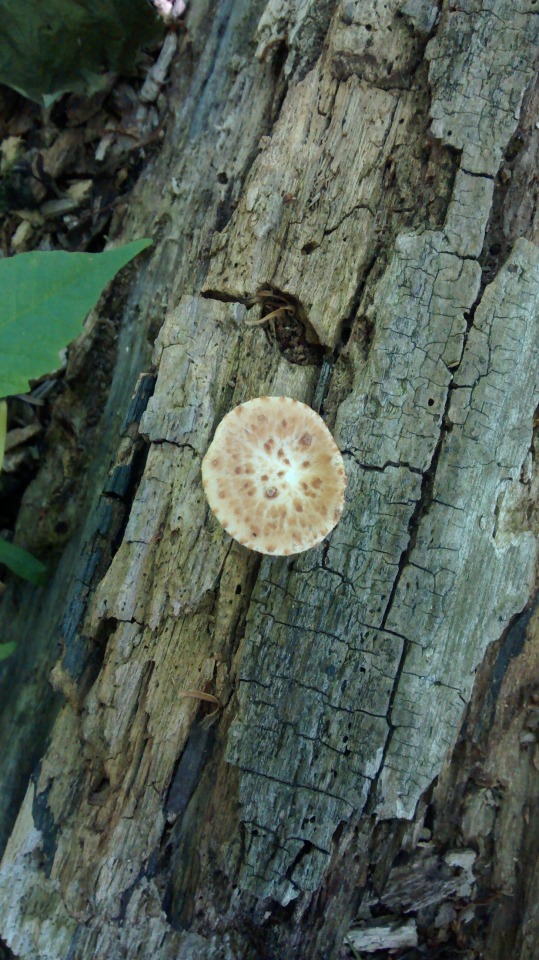

And as it happens, it is! You really want to get it when young, though (the ones in the first two photos are way way too old), because they get tough and chewy. If your knife slides through it easily, it's good.
They have a flavour that lends them well not only to savoury but to sweet! Great with pizza. If you find one with a funnel shape, you can stuff it. You can make jam (which ends up having a nice smoky flavour) with them, or add them to smoothies. Maybe even mix them into cookie dough or add them to pie filling!
Unlike most wild mushrooms, these are *said* to be safe to eat raw. I would not recommend that and would say to cook them to be safe. Watch out for lookalikes too. These are polypores, which means instead of gills on the underside they have tiny holes. If it's got gills on the underside, that is not a dryad's saddle.
Word of ethics: leave a third of the young mushrooms you find, and only if there's a lot of them.
#mushrooms#polypores#dryad's saddle#Polyporus squamosus#Cerioporus squamosus#pheasant back#fungi#wild mushrooms#edible mushrooms#edible wild mushrooms#foraging#photography#my photos#blackswallowtailbutterfly
4 notes
·
View notes
Text

Not a good angle for getting an ID, but I think there is a good chance this one is Polyporus squamosus, the Dryad's saddle.
#Bruce Trail#Bognor Marsh#Niagara Escarpment#Bruce Peninsula#Bruce County#Ontario#Canada#hiking#hiking trail#nature#forest#trees#wilderness#outdoors#wetland#marsh#mushroom#mycology#fungus#Polyporus squamosus#Dryad's Saddle#polypore#photography#digital photography#DSLR#Canon 6D#photographers on Tumblr#2022-09-03
1 note
·
View note
Text
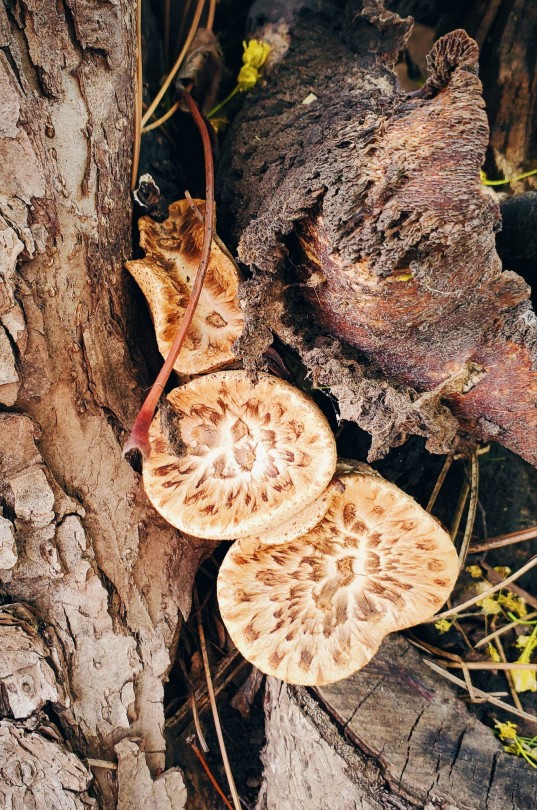
Spotted some Dryad's Saddle! I haven't had any Morel luck at all this year.
(cerioporus squamosus / Polyporus squamosus)
#mushroom#mushrooms#pheasant back#dryad's saddle#fungus#fugi#mycology#nature witch#nature blog#nature photography#green kitchen witch#green witch#kitchen witch#morels#nature#foraged food#foraging#forage
132 notes
·
View notes
Text
my role as an environmental interpreter
Hi everyone, thanks for taking a minute to read my post. This week’s topic is on where we see ourselves as environmental interpreters. For myself over the past couple of years living in Guelph, I found that we are surrounded by so much nature that I wanted to learn more about. Every time I would need space to myself or a moment to breath I would go for a walk in the forest by my house, often having to scramble back before the sun set.
There are so many beautiful spots in Guelph that often go unlooked and unappreciated. Therefore, I see my role as an environmental interpreter as someone who is able to show others how to appreciate the nature they see in front of them that is so easily missed. This role might entail leading a foraging hike through the Speed River Trail - one of my absolute favourites.
Being a nature interpreter allows for the ability to connect others to nature in a way they might not have been able to see before. A walk through a forest might just be a walk for some people, but with a nature interpreter, one could help discover and forage the different mushrooms that are growing all around. Some of my favourites that I’ve found recently around Guelph are pheasants back (Polyporus squamosus) mushrooms and giant puffballs. Both mushrooms are edible if forged when they are young and identified correctly, and can have health benefits (PDQ Integrative, 2023).
Another example of a delicious forgeable that can be found around Guelph on a brief walk is fiddleheads. Fiddleheads are baby fiddlehead ferns that are poking their way through the soil during the spring. I will admit they are delicious with butter and garlic, however when foraging, it is a skill to be able to restrain yourself from taking too much. If you take too many fiddleheads for yourself, then there are not always enough ferns that grow throughout the summer to reproduce to provide the fiddleheads for the next year and so on. The same goes for any mushrooms as well.

A skill that I would like to develop in the context of my role as an environmental interpreter would be to go with the flow in terms of what I have planned to talk about or where to go. I like my plans and I like being prepared. However, I am slowly learning that being in and with nature requires an open mind and the ability to go with the flow; I skill I know I still need to work on.
That’s for now, thank you for reading 😊
References:
PDQ Integrative, Alternative, and Complementary Therapies Editorial Board. PDQ Medicinal Mushrooms. Bethesda, MD: National Cancer Institute. Updated <01/13/2023>. Available at: https://www.cancer.gov/about-cancer/treatment/cam/hp/mushrooms-pdq.
2 notes
·
View notes
Text
1.
Pheasantback (Polyporus squamosus)


Mushroom Gatherer Tee // Brett Manning
670 notes
·
View notes
Photo


dryads saddle or Polyporus squamosus found on living or dead deciduous wood
0 notes
Photo
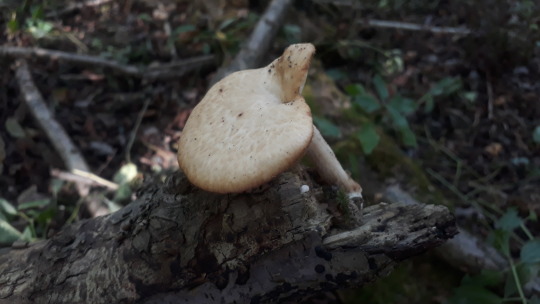

Cambridge, UK, September 2022
Dryad’s saddle (Polyporus squamosus)
Lovely little example of one of my favourite edible fungi - these have the surprising taste of melon or cucumber, although they unfortunately quickly become tough as they get older. If I’ve time, I’ll go back in a week to see if it’s grown big enough to harvest.
24 notes
·
View notes
Text





I fucking love mushrooms and this big boi has been growing on our tree for years and I finally was able to identify it! It’s a Dryads Saddle, scientifically known as Polyporus squamosus! It’s edible, but tastes like watermelon rien! It’s commonly found on decaying trees but can be found on live trees, becoming a parasite and giving the tree white rot! I’m so happy I was able to identify it!! I love mushrooms so much!!!
#mushrooms#dryads saddle#polyporus squamosus#i love mushrooms#special interest#adhd things#living with adhd#my special interest#adhd special interest#nature#mother nature
27 notes
·
View notes
Text
The smaller, lighter one could be Polyporus tuberaster. Especially based on it’s generally lighter color, thinner base, and the thinner white margin on the edge of the cap.
The other one is absolutely Cerioporus squamosus.






I feel like these are two different species of Polyporus/Cerioporus. Or maybe the paler ones just look funky
169 notes
·
View notes
Photo

A very large Kellogg’s Smack.
A baby dryad’s saddle mushroom, my first sighting of the species this year. Polyporus squamosus smells like watermelon and some folks make “candy” out of its tough tough cap. The Missouri Dept. of Conservation considers it a good edible but personally I find it pretty rough to work with, although I have tried…
Scroll down to Status on this page for the candy instructions.
#dryads saddle#polyporus squamosus#pheasant back#mushrooms#mushies#mushroom#baby mushroom#cute mushroom#cute mushie#forestcore#forest floor#naturecore#edible mushroom#wild edibles#foraging#nature#fungus#fungi#fantastic fungi#fungus among us#original photographers#missouri nature#midwest
17 notes
·
View notes
Text
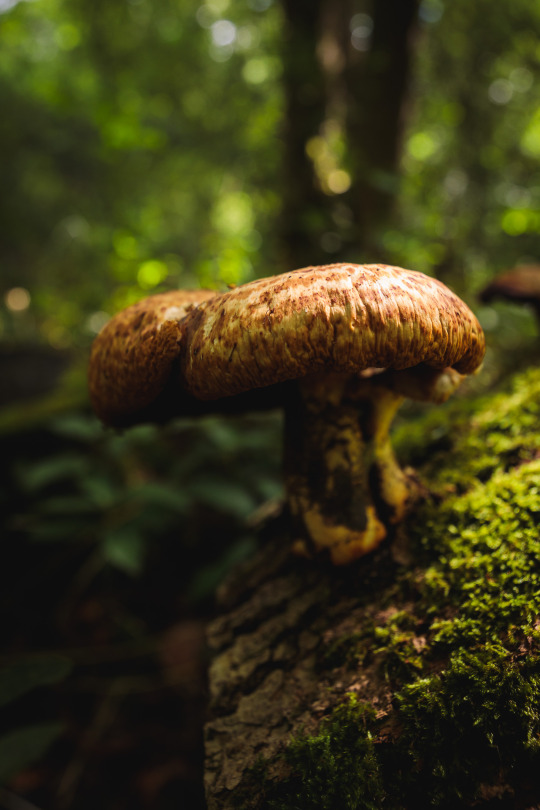
Sunlit Fungi
A shaft of sunlight catching Dryad's Saddle sprouting from a moss covered log in Short Wood.
#canon#canonuk#dryad's saddle#fungi#fungus#mushroom#mushrooms#nature#nature reserve#northamptonshire#northants#outdoors#polyporus squamosus#short and southwick woods#short wood and southwick wood#summer#toadstool#toadstools#wildlife trust#wildlife trusts#woodland#woods
14 notes
·
View notes
Photo



#nature#nature photography#woods#mushrooms#fungi#mushroom photography#polyporus squamosus#i think#Suillus granulatus#original photographers#photographers on tumblr#latvia
100 notes
·
View notes
Text

Some close-up pics of the dryad's saddle mushrooms, Polyporus squamosus.
#Bruce Trail#Sydenham section#Niagara Escarpment#Bruce County#Ontario#Canada#hiking#hiking trail#forest#trees#wilderness#outdoors#landscape#7th Street W Side Trail#side trail#mushroom#mycology#fungus#polypore#Polyporus squamosus#bracket fungus#photography#digital photography#DSLR#Canon 6D#photographers on Tumblr
18 notes
·
View notes
Text


Polyporus squamosus and the pores under a hand lens
3 notes
·
View notes